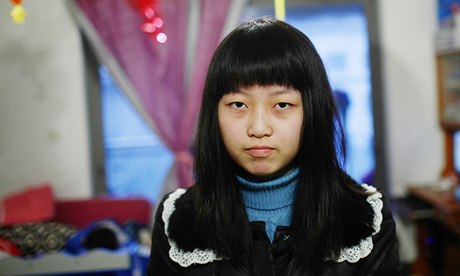Zhan Haite
Most Chinese political activists are grizzled lawyers, scholars and artists, one-time insiders that have been cast loose. Zhan Haite doesn't fit the mould.
Last winter, Zhan, an ambitious 15-year-old middle-school student in Shanghai, became an unlikely crusader against the country's draconian residence registration system, the hukou, a bureaucratic knot tying hundreds of millions of migrant workers to their rural hometowns.
Although Zhan attended primary and middle school in Shanghai – she moved there with her family in 2002 – she lacked a local hukou, precluding her from taking the city's high school entrance examination. Zhan was told she had two options: attend a vocational school, or return to her ancestral village, where opportunities are scarce.
Instead, Zhan decided to speak out. She organised a protest in front of Shanghai's education bureau, and posted a flurry of dissenting messages online. At first, the backlash was severe. Her family was briefly evicted. Local authorities threw her father in jail.
Yet Zhan's message was well-timed – hukou reform had recently risen to the top of the national agenda – and state-run media outlets began to take notice. Zhan was allowed to pen an op-ed in the China Daily newspaper, which ran under the headline Teen Girl Makes Case for Change.
In an interview in December, Zhan listed her heroes as Martin Luther King, Aung San Suu Kyi and Hu Shi, a prominent Chinese essayist who died in 1962. "Hu Shi once said that fighting for your rights is fighting for the nation's rights, and fighting for your freedom is fighting for the nation's freedom," she said. "A free and democratic country cannot be made up of slaves."
RaSia Khepra
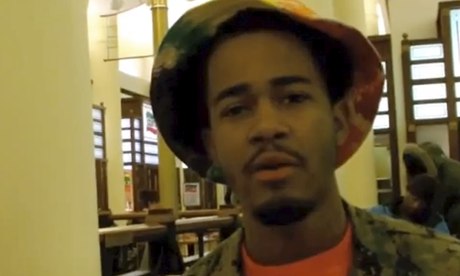 RaSia Kephra, who campaigns against gun violence in Chicago. Photograph: YouTube
RaSia Kephra, who campaigns against gun violence in Chicago. Photograph: YouTubeCollege freshman RaSia Khepra had always wanted to address the rampant violence plaguing his home city of Chicago – where more than 500 people were killed by guns in 2012 – but the death of his close friend is what motivated him to act.
Hadiya Pendleton, 15, was killed at random by a gunman on Chicago's South Side, a week after she performed at Barack Obama's inauguration celebration in January. Khepra was familiar with the sounds of gunfire in his neighbourhood and knew several people who had been shot, but Pendleton's death inspired him to act.
"I don't think having somebody that close to you can ever leave your mind if they've been taken in such a way," Khepra told the Huffington Post. "I do, definitely, think about her every day because I'm used to seeing her every day."
Khepra and other Chicago teenagers created the anti-violence awareness campaign Project Orange Tree, which helps co-ordinate community activities to stimulate a conversation about the causes of gun violence and is supported by the rapper Lupe Fiasco. Khepra said gun violence was often written off as a gang problem, but the issue also affected members of the community not affiliated with gangs. "I don't think a lot of the violence that's being labelled gang-related violence is as prevalent as it's being hyped up to be," he said.
Kelvin Doe
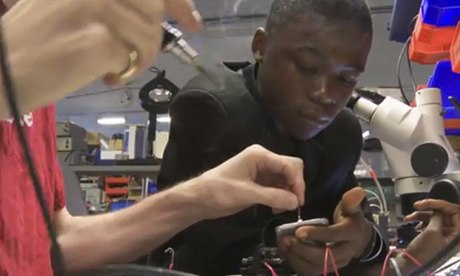 Kelvin Doe, from Sierra Leone, has lectured to engineering students at Harvard. Photograph: YouTube
Kelvin Doe, from Sierra Leone, has lectured to engineering students at Harvard. Photograph: YouTubeKelvin Doe was born to a single mother when Sierra Leone was being torn apart by civil war. "Her resilience and self-belief made it possible for me to be alive today," he once said. Kelvin was six when the diamond-funded conflict, notorious for the systematic amputation of victims' limbs, finally drew to a close.
Turning 17 this month, he is a personification of how the west African country is trying to rebuild and look forward. A short film about him has been viewed more than 5m times on YouTube.
Doe is a self-taught engineer of astonishing precocity. At the age of 11, he rummaged in dustbins for scrap electronics parts that could fix local problems. At 13 he made his own battery by throwing together acid, soda and metal in a tin cup, waiting for the mixture to dry and wrapping tape around it. This proved a big financial saving on batteries.
Frustrated by lack of a reliable electricity supply in his neighbourhood, Doe built a generator using parts that were home made or rescued from the rubbish. The generator also powered a community radio station that he built from recycled materials. He plays music under the name DJ Focus and employs his friends as journalists and station managers.
"They call me DJ Focus because I believe if you focus, you can do an invention perfectly," Doe said in the video on the Thnkr YouTube channel that proved a worldwide hit.
He had never been more than 10 miles from his home in Freetown until he won a national schools innovation competition and was picked last year for a trip to America, where he spoke at the Meet the Young Makers panel at the World Maker Faire in New York.
Doe became the youngest ever "visiting practitioner" with the Massachusetts Institute of Technology (MIT) International Development Initiative. He presented his inventions to MIT students, took part in research and lectured to engineering students at Harvard College. He has been featured on CNN and NBC News and was a speaker at TEDxTeen.
His mentor David Sengeh, a PhD student at the MIT media lab, said: "The inspirational effects of the original Thinkr YouTube video have been remarkable. It has had a tremendous impact on Kelvin's life, on my life and on millions of people all over the world everywhere. In Sierra Leone, other young people suddenly feel they can be like Kelvin."
Rene Silva
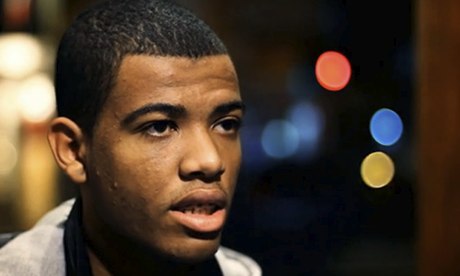 Rene Silva set up his first newspaper at 11 and live-tweeted a police raid on his favela. Photograph: Vimeo
Rene Silva set up his first newspaper at 11 and live-tweeted a police raid on his favela. Photograph: VimeoWhile most Brazilian teenagers are interested in computer games, homework, football or baile funk, Rene Silva has dedicated himself to fighting negative stereotypes about his favela community.
He set up his first newspaper at the age of 11, live-tweeted a police raid on his neighbourhood at 17 and has just completed his first book at the age of 19.
The shanty towns of Rio de Janeiro were long seen as violent no-go zones run by armed drug gangs, But Silva has used social media to show a more sympathetic, complex and hopeful side.
"The important thing about being young and doing what I do in the favelas is to create new points of reference," he said. "In the past, it was drug trafficking. Today, there is more recognition of the people who are trying to do good and change the reality of the place where they live."
Conscious of the shortcoming of the mainstream media, one of his teachers asked him to set up a community newspaper in 2005. At first, his family were doubtful about what he could achieve. His mother would scold him for getting home late from school because he had spent so long reporting and writing for Voz das Comunidades (Voice of the Community).
But he became the focus of every media organisation in the country five years later when he live-tweeted a huge military and police operation to "pacify" the Alemão favela where he lived. Silva's microblog corrected mistakes made by TV reporters and raised warnings about a young boy who was caught in the crossfire between the police and gangsters. HIs followers jumped from a few hundred to tens of thousands and his newspaper - now largely online - secured sponsorship.
Still not 20, Silva published a book this August, A Voz do Alemão, about the residents of his favela, which he hopes will further change perceptions of Rio's shantytown communities and expose the problems they continue to face after pacification.
Jack Andraka
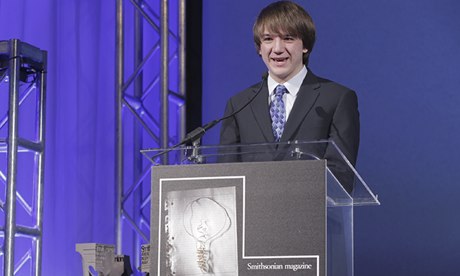 Jack Andraka speaks after receiving Smithsonian Magazine's first annual American ingenuity award for youth achievement last year. Photograph: Brendan Hoffman/Getty Images for Smithsonian Mag
Jack Andraka speaks after receiving Smithsonian Magazine's first annual American ingenuity award for youth achievement last year. Photograph: Brendan Hoffman/Getty Images for Smithsonian MagJack Andraka, 16, is the most recent grand prize winner of the Intel international science and engineering fair – where he unveiled an inexpensive way to detect pancreatic cancer.
At the age of 14 the Maryland boy investigated the disease after it had killed a close family friend, and found that it spreads rapidly and is rarely detected in its early stages. It is estimated to be the 13th most common cancer in the world and the eighth most deadly.
To try to fill the void of low-cost, quick, early-screening methods, Andraka emailed professors at nearby research institutions with a proposal and budget for research. Andraka said he contacted 200 researchers and one accepted the offer – Dr Anirban Maitra, professor of pathology and oncology at Johns Hopkins University.
With Maitra, Andraka conducted research and devised his prize-winning, inexpensive diagnostic method that can efficiently detect a protein for the cancer with 90% accuracy.
"This was a big accomplishment for me. It fulfilled my biggest and wildest dreams," Andraka told the Baltimore Sun. "But also, it means that I can actually get the word out about this deadly disease and this new test that I use to detect it."
Zea Tongeman
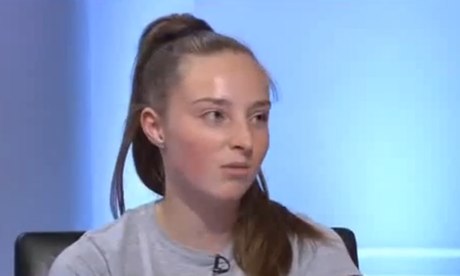 Zea Tongeman designed an app with a friend that aims to get people recycling by turning the sometimes tiresome task into a game. Photograph: GMT
Zea Tongeman designed an app with a friend that aims to get people recycling by turning the sometimes tiresome task into a game. Photograph: GMTZea Tongeman, a 14-year-old from south London, was not a self proclaimed tech geek. "I used to think technology was just fixing computers and saying thing like: "have you tried turning it on and off again?" like in The IT Crowd," she says. But when she realised, after a Little Miss Geek workshop in her school, St Saviour's and St Olave's in Elephant and Castle, that tech could be fun and a force for good, she changed her mind. With a friend, Jordan Stirbu, she designed an app called Jazzy Recycling that aims to get people recycling by turning the sometimes tiresome task into a game.
"As Mary Poppins says: 'You find the fun and it becomes a game,' and that is exactly what our app does," she says.
Jazzy Recycling helps users find places to recycle, tells them what they can recycle and then enables them to scan, share and get rewards for their efforts.
Tapping into the teen mania for sharing even the most mundane titbits of daily life on social media, the game is then shared among friends.
Now Zea has some celebrity backing. Raj Dhonota, business consultant and an angel investor, who appeared on the Apprentice, is helping the pair build the app and they hope to launch in 2014.
She says: "To have people actually using our app and to know we have made a difference would be incredible, so fingers crossed it all goes to plan."
